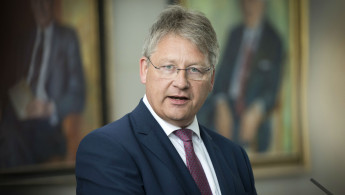Turkey summons German diplomat over spy chief comments
Turkish authorities on Tuesday summoned a top German diplomat after Germany’s spy chief said he was not convinced Turkish cleric Fetullah Gulen is connected to last year’s attempted coup against President Recep Tayyip Erdogan.
Turkey’s foreign ministry summoned the German charge d’affaires in Ankara to express its anger a statement by Bruno Kahl, the head of the Federal Intelligence Service, the ministry said.
Kahl over the weekend told Der Spiegel that his country had yet to be convinced of Gulen’s involvement in the July 15 coup attempt.
Ankara accuses the US-based Turkish cleric of orchestrating the coup and has embarked on a wide-reaching clampdown on his supporters, purging over 100,000 of his alleged followers from government positions and formally arrested nearly 41,000.
Nearly 600 companies have been also seized, many of them smaller provincial firms, over links to Gulen.
The European Union and human rights groups have criticised Turkey’s heavy-handed clampdown.
Critics claim the crackdown goes well beyond the suspected coup plotters and targets anyone who has dared show opposition to President Erdogan.
Gulen, a former ally turned political foe of Erdogan, has denied involvement in the coup.
German-Turkish relations have been strained in recent weeks after German authorities blocked pro-Erdogan rallies promoting an upcoming referendum to extend the president’s powers.
Ankara reacted with fury, with Erdogan accusing Germany and Chancellor Angela Merkel of "Nazi" practices, sparking deep consternation in Berlin.
On Monday, Chancellor Angela Merkel warned that Germany could ban future campaign events by Turkish politicians on its soil unless Ankara stops "Nazi" jibes aimed at Berlin.
Merkel stressed that such insults must stop - "no ifs, no buts" - and that Germany reserved the right to "take all necessary measures, including reviewing the permissions" for campaign events it had already granted.
A stern-faced Merkel said such comments were "breaking every taboo, without consideration for the suffering of those who were persecuted and murdered" by the Nazis.
Other EU countries - including the Netherlands - have had similar rows with Turkey, a candidate country for membership in the bloc.
Over the past year Germany has also banked on an EU agreement with Turkey that has sharply reduced the influx of asylum seekers that has brought one million refugees and migrants to Germany since 2015.
However, Berlin has emerged as a strident critic of Ankara's vast post-coup crackdown.





 Follow the Middle East's top stories in English at The New Arab on Google News
Follow the Middle East's top stories in English at The New Arab on Google News
![Israeli forces ordered bombed Gaza's Jabalia, ordering residents to leave [Getty]](/sites/default/files/styles/image_330x185/public/2176418030.jpeg?h=a5f2f23a&itok=_YGZaP1z)

